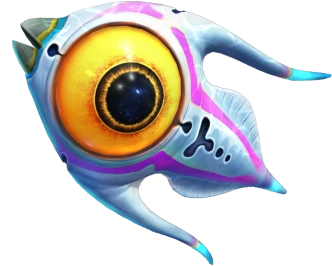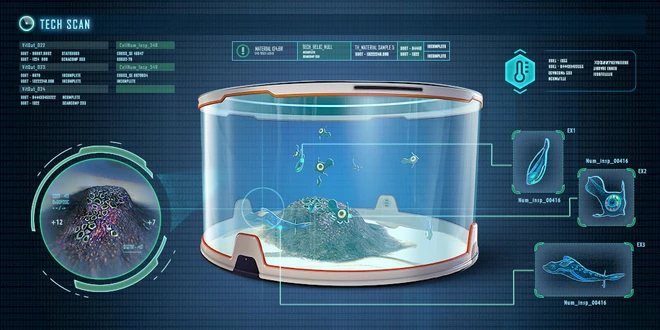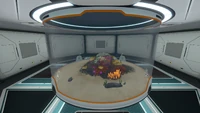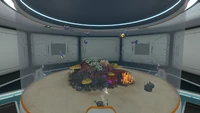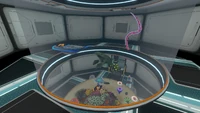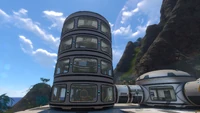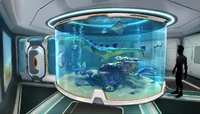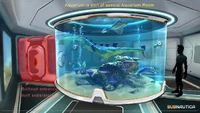Aquariums provide an ideal opportunity to study alien fauna up close. Select carefully which lifeforms you bring onboard - they may also be studying you.
― PDA, Dialogue
The Alien Containment is a large, cylindrical aquarium which can be filled with Fauna that have been caught or hatched by the player. It is built using the Habitat Builder only inside a Multipurpose Room. The blueprint can be retrieved via a data box.
|
Spoiler alert: The following section contains story related material. |
|---|
|
An Alien Containment can be found and scanned in the Deep Grand Reef Degasi Base. |
Building
In order to get inside the Alien Containment, the player must build a Hatch on one of the sides. The player can then enter the Alien Containment and release caught fish into it. Non-edible fish can be added through the use of their respective eggs. If two or more Multipurpose Rooms are stacked on top of each other, building Alien Containments inside each room will cause the Containers to merge into one higher tank.
Uses
If the player leaves two creatures of the same species inside the Alien Containment for long enough, they will breed and another fish of the same species will spawn inside. Edible Fauna, such as the Peeper, will reproduce approximately twice a day once mature. Once the Alien Containment reaches a population of ten fish, the reproductive process will stop. If more fish are added after the maximum is reached, some will die and float to the top of the container. Multiple Alien Containments stacked on top of each other will increase the amount by ten each.
Eggs can be placed inside the Alien Containment. This can be done by simply dropping the Eggs inside the Alien Containment. Eggs will take about three to five in-game days (sometimes less) to hatch. When hatched, the fauna within the eggs will create smaller versions of said fauna, and will grow inside the Alien Containment. Non-edible Fauna can be bred this way to be used as fuel for the Bioreactor. Keep in mind that egg-laying fish will keep laying eggs (so long as there are two or more) and hatching them until the population cap is reached, as stated above.
Flora can be placed inside the Alien Containment, via a Planter UI with sixteen slots that appears when hovering above the soil. This can be used as an alternative to the Exterior Growbed for farming aquatic resources. Tiger Plants will attack certain fish if planted in the Alien Containment, potentially killing the fish and damaging the base. Creepvines and Bloodvines will not grow to their full height without stacking Alien Containments.
|
Spoiler alert: The following section contains story related material. |
|---|
|
Placing fauna infected with the Kharaa Bacterium into the Alien Containment will infect the other fauna after some time. However, this is just an aesthetic change and has no effect on the fauna. Placing a Peeper carrying Enzyme 42 inside will cure all infected creatures in a containment. |
Aggressive Fauna hatched inside the Alien Containment will have a passive attitude towards the Player when they enter the Alien Containment, and generally also if they are released into the wild. They will not attack other fauna inside the Alien Containment, but will do so if released into the wild, even other fish hatched inside the Alien Containment. Once released into the wild, Aggressive Fauna will also attack small player vehicles, regardless of whether the player is in them or not, although they lose interest much faster than their wild counterparts. Ampeels will still deal touch damage even if raised in an Alien Containment, and Crabsquids raised in containment are just as dangerous as wild ones once they have been released from the Alien Containment.
The Cyclops' sonar does not recognize Aggressive Fauna in an Alien Containment as non-hostile and will thus mark any species that can threaten the vessel, like Ampeels and Crabsquids, as nearby threats.
Useful Fauna
- Bladderfish - it is the best choice for a start or when intending to breed only 1 species. While the Bladderfish is far from the best food source it more than compensates for it due to having a lot more applications than all other breedable fauna:
- Food source - a cooked Bladderfish provides 16 units of food, making it the least nutritious edible fauna, however still more filling than any plant based food
- Water source - the Bladder fish is the only fauna that can be converted into Filtered Water
- Oxygen replenishment - this is also unique to the Bladderfish, when eaten raw it will replenish 15 units of oxygen
- Energy source - the Bladderfish provides 210 energy for the Bioreactor per slot, which is equivalent to the Acid Mushroom
- Reginald - when breeding more than 1 species the Reginald should be next in line:
- Food source - a cooked Reginald provides 44 units of food, the highest of all edible fauna
- Energy source - the Reginald provides 490 energy for the Bioreactor per slot, making it the 2nd most efficient fuel
- Oculus - it provides 630 energy for the Bioreactor per slot, making it the most efficient fuel. A Bioreactor filled with Oculus will have a supply of 10080 energy which is a bit over half of what a single Reactor Rod holds i.e. 20000
Plantable Flora
For a complete list of plantable flora, visit List of Plantable Flora.
Recipe
Data Bank Entry
|
Despite huge, Alterra-led advancements in stellar technology, exploring new worlds still has its challenges, and alien lifeforms are one of them. That's why we built the alien containment unit. The unit is designed primarily to breed larger or more dangerous species. Technical Provisions: Breeding Tips: Warnings: |
Gallery
Trivia
- The former name for the Alien Containment was the Large Aquarium, and before that, the Water Park.
- However, the spawn ID for the Alien Containment is still basewaterpark.
Bugs
 Predators outside a Seabase often try to attack prey species inside an Alien Containment. Sometimes if the player leaves and returns they will find a predator swimming around inside the Multipurpose room, or even clipped inside the Alien Containment itself. If the latter occurs, they will still be a full-sized specimen and will attempt to eat any prey species as they normally would.
Predators outside a Seabase often try to attack prey species inside an Alien Containment. Sometimes if the player leaves and returns they will find a predator swimming around inside the Multipurpose room, or even clipped inside the Alien Containment itself. If the latter occurs, they will still be a full-sized specimen and will attempt to eat any prey species as they normally would.
 Saving and quitting while inside of an Alien Containment will allow you to walk around as if you were standing inside your base, and trying to exit the Alien Containment will enter it instead.
Saving and quitting while inside of an Alien Containment will allow you to walk around as if you were standing inside your base, and trying to exit the Alien Containment will enter it instead. An alien containment build above water will have oxygen in it. You still swim around in it as usual.
An alien containment build above water will have oxygen in it. You still swim around in it as usual.
